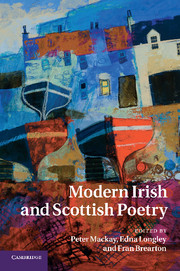Book contents
- Frontmatter
- Contents
- List of contributors
- Acknowledgements
- Introduction
- 1 Swordsmen: W. B. Yeats and Hugh MacDiarmid
- 2 Tradition and the individual editor: Professor Grierson, modernism and national poetics
- 3 Louis MacNeice among the islands
- 4 Townland, desert, cave: Irish and Scottish Second World War poetry
- 5 Affinities in time and space: reading the Gaelic poetry of Ireland and Scotland
- 6 Contemporary affinities
- 7 The Classics in modern Scottish and Irish poetry
- 8 Translating Beowulf: Edwin Morgan and Seamus Heaney
- 9 Reading in the gutters
- 10 ‘What matters is the yeast’: ‘foreignising’ Gaelic poetry
- 11 Outside English: Irish and Scottish poets in the East
- 12 Names for nameless things: the poetics of place names
- 13 Desire lines: mapping the city in contemporary Belfast and Glasgow poetry
- 14 ‘The ugly burds without wings’?: reactions to tradition since the 1960s
- 15 ‘And cannot say / and cannot say’: Richard Price, Randolph Healy and the dialogue of the deaf
- 16 On ‘The Friendship of Young Poets’: Douglas Dunn, Michael Longley and Derek Mahon
- 17 ‘No misprints in this work’: the poetic ‘translations’ of Medbh McGuckian and Frank Kuppner
- 18 Phoenix or dead crow? Irish and Scottish poetry magazines, 1945–2000
- 19 Outwith the Pale: Irish–Scottish studies as an act of translation
- Guide to further reading
- Index
- References
10 - ‘What matters is the yeast’: ‘foreignising’ Gaelic poetry
Published online by Cambridge University Press: 18 April 2011
- Frontmatter
- Contents
- List of contributors
- Acknowledgements
- Introduction
- 1 Swordsmen: W. B. Yeats and Hugh MacDiarmid
- 2 Tradition and the individual editor: Professor Grierson, modernism and national poetics
- 3 Louis MacNeice among the islands
- 4 Townland, desert, cave: Irish and Scottish Second World War poetry
- 5 Affinities in time and space: reading the Gaelic poetry of Ireland and Scotland
- 6 Contemporary affinities
- 7 The Classics in modern Scottish and Irish poetry
- 8 Translating Beowulf: Edwin Morgan and Seamus Heaney
- 9 Reading in the gutters
- 10 ‘What matters is the yeast’: ‘foreignising’ Gaelic poetry
- 11 Outside English: Irish and Scottish poets in the East
- 12 Names for nameless things: the poetics of place names
- 13 Desire lines: mapping the city in contemporary Belfast and Glasgow poetry
- 14 ‘The ugly burds without wings’?: reactions to tradition since the 1960s
- 15 ‘And cannot say / and cannot say’: Richard Price, Randolph Healy and the dialogue of the deaf
- 16 On ‘The Friendship of Young Poets’: Douglas Dunn, Michael Longley and Derek Mahon
- 17 ‘No misprints in this work’: the poetic ‘translations’ of Medbh McGuckian and Frank Kuppner
- 18 Phoenix or dead crow? Irish and Scottish poetry magazines, 1945–2000
- 19 Outwith the Pale: Irish–Scottish studies as an act of translation
- Guide to further reading
- Index
- References
Summary
Writing several years ago about the Scots-language poet Sydney Goodsir Smith, I suggested that the dynamic between what we perceive as foreign and what we perceive as native may be inherently unstable. The elements on either side of the equation – an equation whose equals sign ought, we fondly hope, to have the firmest of strokes through it – tend to replace one another with maddening frequency. Indeed, they may turn into one another unpredictably and without warning.
This instability is related to two fundamental paradoxes underlying the activity of cultural nationalists, so fundamental in Ireland in the years preceding and following the 1916 Rising and, in Scotland, in the wake of the 1978 referendum and still today. If we are to evaluate, or even simply to offer a faithful account of, this activity, then we would do well to keep these paradoxes in mind. With their assistance we may avoid reproducing certain pitfalls, or stumbling into certain dead ends which characterised both enterprises.
On the one hand, cultural nationalism was itself a foreign import. MacDiarmid, for example, contemplating the potential scope and meaning of a Scottish Renaissance movement in the early 1920s, refers again and again to what is taking place abroad, in Belgium or Norway, as well as in Ireland. ‘Look what is happening out there!’ he effectively says. ‘Should not we be doing the same here? Why are no similar changes occurring in Scotland?’
- Type
- Chapter
- Information
- Modern Irish and Scottish Poetry , pp. 176 - 190Publisher: Cambridge University PressPrint publication year: 2011



